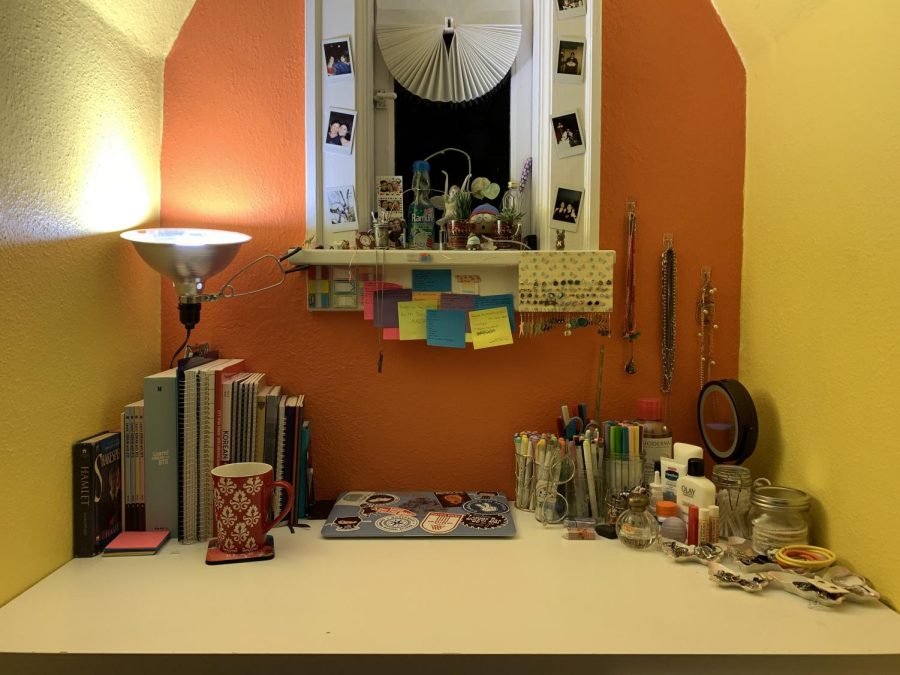10 Tips to Stay Organized, Productive, and Improve Mental Health During Online Learning
Clarion photo Piper Gillen
Example of a student workspace during online learning.
November 9, 2020
Online school is a challenge for many people. It can be hard to manage your time in a productive way, and motivation seems to go out the window as soon as you sit down. Staying on track with assignments seems impossible, and overall everything feels so much harder. To help, here is a list of tips that I have found make online school a lot easier.
1) Get up at least 20 minutes before your class starts.
Everyone knows the temptation of hitting snooze on your alarm, and sometimes, those extra 10 minutes of sleep are exactly what you need. The danger comes when you keep hitting snooze or wait until the last possible moment to get up. Giving yourself at least 20 minutes before school starts can be a big help when it comes to feeling ready for the day. It can give you time to get dressed, brush your teeth, or get a glass of water. You also feel more awake when you give yourself more time. Going to class still barely being able to focus can make it seem all that much more impossible to do what you need to do.
2) Don’t do school in bed.
Often, doing school from your bed seems like the best option. However, it can actually make it harder for you to focus. In your head, a bed is somewhere for rest and relaxation. When you continue to stay in bed for your schoolwork it makes school not seem as important and paying attention gets much harder. Working in bed also sends mixed messages to your brain. You begin to associate your bed with a place to work instead of rest, so when you go to sleep you can have a hard time falling asleep and getting restful sleep.
3) Have a designated school area.
Pick an area in your room or house and designate that your school/productivity zone. Having a designated area can help your brain get into work mode when you sit down. As with tip #2, your brain associates different areas with different things. If you do school in the same area every day, your brain will start to see your school/productivity area as that. It can be anything you find useful, your desk, living room, kitchen table, even your floor if that is where you feel comfortable. When you have a specific area, it can be easier to add or take things away as you see fit to feel comfortable.
4) Keep all of your school material in one place.
No two people have the exact same system for doing work, especially when it comes to online learning. It can be very beneficial, though, to keep all of your school-related materials in the same place. Without in-person school, there are no lockers to store things you don’t need at that moment. But keeping everything in the same area can hold a similar purpose. Keeping track of school material is vital to success, so having it all in the same area eliminates the possibility of losing things. If you aren’t prepared with the proper materials for a class, even an online one, productivity and focus can be a lot harder.
5) Write down your assignments.
Another vital key to success is keeping track and turning in all of your assignments. This gets even more important in college, so getting in the practice of writing them down now can be very helpful. There are a bunch of different ways to go about it, so find whatever works for you! Personally, I have found a bullet journal to be very helpful in not just keeping track of school, but also as a way to do art. Bullet journaling can be very hands-on, though, so it’s not for everyone. However, there are so many other tools to use so don’t feel limited to just one. You can get a premade planner, a planner app, use the notes app, or even write down assignments on a spare piece of paper. It’s up to you on how you do it, but no matter how you do it, tracking assignments and due dates makes managing your time a lot easier.
6) Take breaks.
School can be a lot, and taking breaks can help to break up that intensity into smaller, more manageable pieces. Without breaks, productivity slowly goes down, until you aren’t really getting anything done anymore. You can change up your work-to-break ratio for what you personally need, but a general recommended time is an hour of work with a 15-minute break. Breaks allow you to step back and clear your mind, which in turn helps productivity and focus when you get back to work. Don’t feel confined to the hour-15 minute ratio, too. If you feel as though you are on a roll with something, keep working until you are done, but make sure to take a little bit of a longer break because you worked for longer.
7) Make time for a form of self-care every day.
Self-care comes in many different forms. Taking time every day to practice self-care improves mental health and stress levels by a lot. Self-care allows you to slow down and destress. It can be taking a nap, watching a tv show, meditating, doing a facemask, learning a new hobby, whatever makes you comfortable. Just make sure to spend time on yourself every day. With everything going on, the world can feel overwhelming at times. By focusing on yourself for a little while every day, you can make that feeling seem more manageable. You deserve to spend time doing things you love, so try to get it in every day.
8) Listen to music.
Studies have shown that music improves mental health and stress management. Music helps to regulate chemical levels in your brain, which in turn helps improve mental health. Even listening to just an hour every day can drastically affect those things. Again, it can be whatever you feel you need and enjoy. Everyone has a different preference and different music that calms them. Whether it be rap, pop, alternative, show tunes, any genre, try to spend an hour enjoying it every day. You can listen to it in the shower, while doing homework, eating lunch, commuting, any chance you get.
9) Visit with friends.
This time is especially hard because of the inability to see people outside of your nuclear family. Try to reach out to a friend at least once a day. It can be in person, or just sending them a text. One great thing about our increased access to technology is the ability to connect. Getting in touch with a friend or loved one outside of your immediate family can give a nice break to repetition and help mental health. It’s easy to feel alone in these isolating times, but reaching out and connecting helps to show that you aren’t. In addition, you can help a friend who might be struggling with their own mental health and feelings of solitude.
10) Exercise every day.
As with most everything on this list, do whatever makes you feel comfortable. Exercising has many great benefits, the most basic one just being a way to get your body moving and your blood flowing. You can do a high-intensity workout or take a walk around your neighborhood. Getting out and exercising is very beneficial to mental health and productivity, so even just getting up and stretching a few times throughout the day can help get things done. Again, make sure you are comfortable with what you are doing, but also take time to implement things that will set you up for success.
These tips might not work for everyone, and that’s alright! No two people are the same in what will help them and what won’t. However, as I said in tip #10, implementing different things to set you up for success makes your life and your work all that much easier. Use these tips as a jumping-off point to make this school year as good as possible. This year is going to be hard, but you can do it! 🙂














